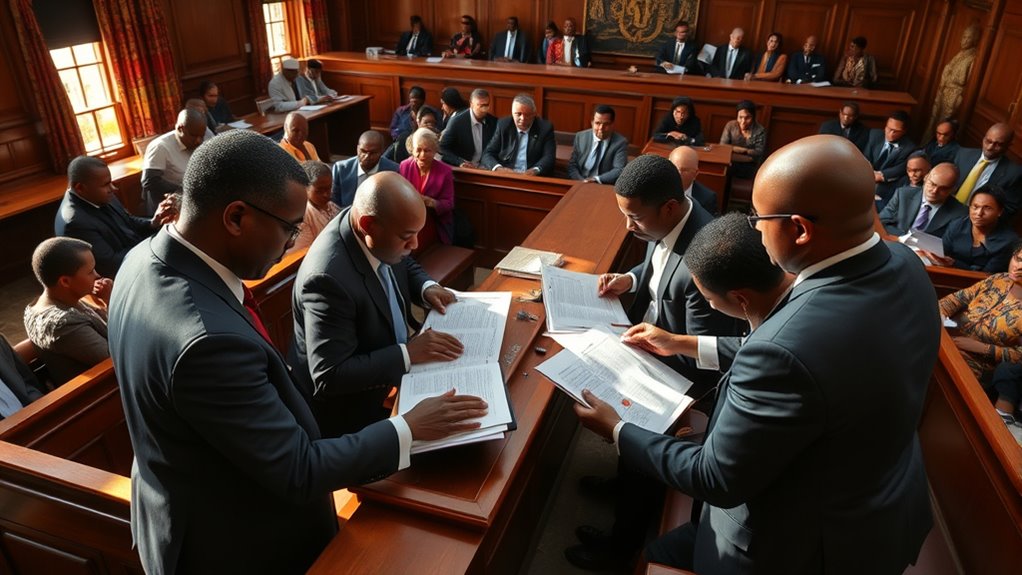Legal translation services in South Africa, such as those from Translation Africa, guarantee accurate and culturally sensitive handling of multilingual legal matters. They specialize in translating documents like contracts, wills, and court transcripts, preventing misunderstandings and supporting justice in diverse settings. Certified professionals adhere to standards set by SATI and the Department of Justice, offering reliable expertise. Continuing with this overview highlights deeper aspects of services, benefits, and innovations.
Quick Summaries
- Legal translation services in South Africa provide accurate, certified translations for documents like contracts and court transcripts across 11 official languages.
- These services ensure equal access to justice by bridging linguistic barriers and preventing misunderstandings in legal proceedings.
- Expert translators handle cultural nuances and challenges, maintaining the original intent and meaning of legal documents.
- Services adhere to standards from SATI and the Department of Justice, ensuring high-quality, reliable results.
- Costs depend on document complexity, language pairs, and urgency, making it essential to plan for effective budget management.
Importance of Legal Translation in South Africa

Legal translation plays an essential role in South Africa, where linguistic diversity affects legal proceedings and international agreements. With 11 official languages, accurate translation guarantees equal access to justice, preventing misunderstandings that could undermine court decisions or contractual obligations. For instance, in multilingual courtrooms, precise translations of testimonies and documents maintain fairness and uphold constitutional rights. This is essential in a nation where language barriers could exacerbate social inequalities. Additionally, in the context of global trade, effective legal translation facilitates international treaties and business contracts, fostering economic stability and cross-border relations. By bridging linguistic gaps, it promotes transparency and compliance, ultimately strengthening the rule of law in a diverse society. Legal translation therefore safeguards societal cohesion and democratic principles, adapting to South Africa’s evolving legal landscape.
Services Provided by Translation Africa

Translation Africa offers specialized services in legal document translation, interpretation, and localization, catering to South Africa’s multilingual environment. These services emphasize precision, cultural nuance, and confidentiality to facilitate seamless cross-cultural legal interactions. By employing certified linguists, Translation Africa guarantees that clients receive reliable support in handling complex linguistic challenges, fostering trust and equity in diverse settings.
The company’s approach not only bridges communication gaps but also evokes a sense of security and empowerment for users.
| Service | Emotional Benefit |
|---|---|
| Legal Translation | Peace of mind from accurate, error-free results |
| Interpretation | Confidence in real-time, clear exchanges |
| Localization | Cultural connection fostering belonging |
| Expert Consultation | Empowerment through tailored advice |
| Quality Assurance | Assurance of reliability and ethical standards |
This commitment helps clients feel supported in their legal endeavors, promoting justice and understanding.
Types of Legal Documents for Translation

South Africa’s multilingual context necessitates translating various documents in legal proceedings, ranging from contracts and wills to affidavits and court transcripts. Contracts, foundational in business and personal agreements, must be rendered accurately to reflect original intent. Wills and estate documents require precise translation to handle inheritance disputes effectively. Affidavits, sworn statements used in courts, demand fidelity to avoid legal complications. Court transcripts, detailing trial proceedings, guarantee all parties comprehend judicial outcomes. Beyond these, property deeds and lease agreements in real estate transactions need careful adaptation for ownership clarity. Immigration papers, including visas and residency permits, facilitate legal compliance in diverse applications. Intellectual property filings, such as patents and trademarks, must be translated to protect rights across languages. Family law items, like divorce decrees and custody orders, guarantee equitable resolution in multilingual families. This diversity underscores the need for specialized translation expertise.
Benefits of Professional Legal Translators
Engaging professional legal translators yields key advantages in South Africa’s diverse legal landscape, including enhanced accuracy that prevents misinterpretations and costly disputes. These experts guarantee seamless communication across languages, safeguarding clients’ interests in complex cases.
- Peace of Mind: Knowing documents are flawlessly translated alleviates anxiety, fostering trust in critical legal proceedings.
- Empowerment through Expertise: Gain confidence from translators’ deep knowledge, turning potential pitfalls into secure victories.
- Emotional Security: Protect sensitive information with unwavering confidentiality, easing fears of breaches in high-stakes environments.
- Relief from Complexity: Avoid overwhelming errors that could lead to heartbreak, ensuring smooth, reliable outcomes for all involved.
Certified Translation Standards in South Africa
In South Africa, certified translation standards are established to maintain the integrity and accuracy of legal documents across languages. These standards are primarily overseen by bodies such as the South African Translators’ Institute (SATI) and the Department of Justice, ensuring translations meet rigorous criteria for official use. Certified translators must possess recognized qualifications, adhere to ethical guidelines, and verify the authenticity of their work through notarization or stamping. This process guarantees that documents like contracts, court judgments, and immigration papers retain their legal validity when translated from languages such as English, Afrikaans, or indigenous tongues. By upholding these benchmarks, South Africa fosters trust in multilingual legal proceedings, supporting international business and governmental operations. Ultimately, certified standards elevate the profession, promoting precision in an increasingly globalized context.
Challenges in Legal Document Translation
Translating legal documents poses significant challenges, particularly in environments with linguistic diversity like South Africa. The country’s 11 official languages, combined with varying legal traditions, demand meticulous accuracy to prevent misinterpretations that could jeopardize cases or rights. Translators must navigate cultural nuances and specialized terminology, where even minor errors can lead to profound consequences.
- The anguish of linguistic barriers: Imagine the frustration when a single mistranslated word alters a contract’s intent, potentially stripping individuals of their entitlements.
- The fear of cultural missteps: Envision the anxiety as subtle cultural differences distort legal meanings, risking injustice in critical proceedings.
- The despair of accuracy demands: Picture the dread of overlooking context-specific terms, leading to financial ruin or prolonged legal battles.
- The emotional toll of high stakes: Feel the weight of translating sensitive documents, where failures could erode trust and exacerbate social inequalities.
Quality Assurance at Translation Africa
Translation Africa prioritizes quality assurance to address the complexities of legal translations in South Africa. The company employs a multi-layered approach, including certified linguists, advanced proofreading tools, and adherence to international standards like ISO 17100. This guarantees accuracy, cultural sensitivity, and error-free delivery in documents such as contracts and affidavits. Regular audits and client feedback loops further refine processes, maintaining high reliability.
| Process Step | Description | Tools Used |
|---|---|---|
| Initial Review | Assess document for potential issues | Style guides |
| Translation Phase | Expert translation by vetted linguists | CAT tools (e.g., SDL) |
| Proofreading | Detailed error checking | Grammarly & human review |
| Final Verification | Compliance and quality sign-off | Quality checklists |
| Delivery Check | Confirm format and deadlines met | Project management software |
This structured method minimizes risks, upholding Translation Africa’s reputation for excellence.
Why Local Expertise Matters for Legal Translation
Local expertise is essential for effective legal translation services in South Africa, as it guarantees accuracy beyond mere language conversion. Understanding cultural nuances helps translators avoid misinterpretations that could alter legal meanings in sensitive contexts. Insights into the South African legal system further enable precise handling of terminology and regulations specific to the region.
Cultural Nuances
In South Africa, cultural nuances often complicate legal translation, as subtle differences in language and customs can alter meanings and intent. These elements are deeply embedded in diverse societies, where idioms, traditions, and social contexts influence legal documents. Local experts, fluent in both language and culture, guarantee translations preserve original implications, preventing costly errors that could undermine justice or trust.
To evoke the emotional stakes involved:
- Misinterpretation risks injustice: Imagine the heartbreak of a family losing a claim due to overlooked cultural symbols, amplifying grief into systemic failure.
- Erodes community trust: Picture the frustration when translations ignore tribal customs, fostering resentment and division in already fragile societies.
- Preserves dignity: Envision the relief in accurately conveying ancestral rights, restoring honor and empowering marginalized voices.
- Fosters reconciliation: Consider the hope ignited by translations that bridge cultural divides, turning potential conflicts into pathways for healing and unity.
Legal System Insights
South Africa’s diverse legal framework, encompassing Roman-Dutch, English common law, and customary systems, underscores the need for local expertise in translations to guarantee accuracy and compliance.
This intricate blend demands translators with deep knowledge of South African jurisprudence to navigate terminology nuances and avoid misinterpretations. For instance, customary law’s community-oriented concepts require culturally sensitive adaptations, while English common law’s contractual precision must align with statutory requirements. Without local insight, errors could lead to invalid documents, legal disputes, or regulatory penalties.
In a multilingual context with 11 official languages, experts guarantee translations preserve legal intent across languages like Afrikaans or Zulu, facilitating effective court proceedings and international agreements. Additionally, staying abreast of reforms, such as those in constitutional law, allows for precise updates, reducing risks in cross-border dealings and enhancing overall reliability. Ultimately, local expertise safeguards the integrity of legal translations in this dynamic environment.
Cost Considerations for Translation Services
Costs for legal translation services in South Africa depend on factors such as document complexity, language pairs, and urgency. These variables can lead to fluctuating prices, influencing decisions for individuals and businesses alike. Understanding these costs helps avoid unexpected expenses and guarantees access to quality services without financial strain.
To evoke the emotional weight of these considerations:
- Overwhelming complexity: The intricate details of legal documents can stir frustration, as clients worry about escalating fees for specialized expertise.
- Cultural language barriers: Selecting rare language pairs may evoke a sense of isolation, yet proper translation fosters connection and justice.
- Urgent deadlines: The pressure of time-sensitive needs can cause anxiety, potentially inflating costs and heightening stress during critical moments.
- Budget empowerment: Wise cost planning instills relief and confidence, transforming potential financial burdens into strategic investments for peace of mind.
Real-World Examples of Legal Translations
Real-world examples demonstrate how legal translations operate in South Africa, such as in court proceedings where accurate rendering of contracts prevents disputes. In international business, translating merger agreements guarantees seamless compliance with local regulations, as seen in cross-border deals involving foreign investors. For instance, a mining company’s translated environmental permits have averted legal challenges by clarifying obligations in multiple languages. In immigration disputes, precise translation of visa applications and refugee claims upholds procedural fairness, allowing tribunals to base decisions on accurate evidence. Similarly, family law cases benefit from rendering wills and adoption papers, safeguarding inheritance rights and parental agreements. These applications underscore the critical role of expert translators in fostering equitable legal outcomes, enhancing trust in South Africa’s judicial system.
Language Barriers in South African Legal Contexts
Language barriers in South African legal contexts hinder access to justice by complicating communication for non-English or non-Afrikaans speakers. These obstacles impact fair proceedings and necessitate targeted strategies for resolution. Cultural linguistic challenges further exacerbate issues, demanding nuanced handling to guarantee equitable outcomes.
Impact on Justice
In South African legal contexts, language barriers often undermine the fairness of judicial proceedings by impeding defendants’ comprehension of charges, evidence, and their rights. This results in skewed outcomes, where miscommunication can lead to wrongful convictions and deepen social inequalities. The emotional toll on individuals and communities is significant, highlighting the human cost of linguistic divides.
- Defendants’ isolation: Imagine the terror of standing trial without understanding accusations, amplifying feelings of vulnerability and despair.
- Witnesses’ frustration: Picture the anguish of failing to express crucial truths due to language gaps, potentially distorting justice and causing lifelong regret.
- Family devastation: Envision loved ones grappling with incomprehensible proceedings, fostering helplessness and eroding familial bonds amid uncertainty.
- Community erosion: Contemplate the widespread resentment as marginalized groups witness repeated injustices, breeding distrust and generational trauma in society.
Overcoming Language Obstacles
Despite the profound challenges posed by language barriers in South African courts, innovative strategies and professional translation services are emerging to guarantee equitable access to justice. In multilingual environments, certified translators play a pivotal role, providing accurate real-time interpretation during trials to guarantee all parties comprehend proceedings fully. Advanced technologies, such as digital translation tools and AI-assisted systems, are being integrated to bridge gaps swiftly and cost-effectively. Legal institutions are also adopting policies that mandate qualified interpreters in key hearings, reducing miscommunications that could undermine fair outcomes. Training programs for legal professionals emphasize linguistic accuracy, fostering a more inclusive system. Companies like Translation Africa offer specialized services, delivering precise translations of documents and testimonies to uphold the rule of law. Ultimately, these efforts enhance trust in the judicial process, promoting broader societal harmony.
Cultural Linguistic Challenges
South Africa’s multicultural society intensifies linguistic barriers in legal contexts, where cultural nuances often distort interpretations of laws and testimonies. These challenges exacerbate inequalities, as misinterpretations can undermine justice and erode trust in the system, particularly for marginalized groups.
- The heartbreak of families: When cultural idioms in testimonies are lost, innocent individuals face wrongful convictions, amplifying grief and betrayal.
- The outrage of injustice: Defendants endure biased rulings due to untranslated customs, fueling anger and a sense of systemic discrimination.
- The isolation of communities: Witnesses feel alienated when their heritage is overlooked, evoking deep loneliness and frustration in seeking redress.
- The desperation for equity: Legal participants experience hopelessness from repeated failures, stirring urgent calls for culturally sensitive reforms to restore dignity and hope.
Technological Innovations in Legal Translation
Technological advancements have reshaped legal translation services in South Africa, with AI-driven tools and machine learning algorithms enhancing accuracy and efficiency. These innovations streamline complex legal terminology, reducing errors in multilingual documents and accelerating processes for courts and businesses. For instance, neural machine translation systems adapt to South Africa’s diverse languages, like Zulu and Afrikaans, while maintaining precision in legal contexts. This integration minimizes human oversight needs, fostering cost-effective solutions without compromising quality.
| Technological Innovation | Key Benefits |
|---|---|
| AI-Driven Tools | Improved Accuracy |
| Machine Learning | Faster Processing |
| Cloud-Based Platforms | Enhanced Collaboration |
Team Expertise at Translation Africa
Translation Africa’s team comprises highly skilled linguists and legal experts who specialize in accurate and culturally nuanced translations. These professionals bring years of experience in South Africa’s diverse legal landscape, ensuring precision in complex documents like contracts and court filings. Their expertise combines linguistic mastery with in-depth legal knowledge, adapting to local customs and regulations for flawless results.
To evoke the reliability and dedication of this team, consider:
- Unwavering commitment to ethical standards, instilling a sense of security in clients facing high-stakes legal challenges.
- Profound cultural insight that sparks empathy, bridging divides and fostering genuine understanding.
- Meticulous attention to detail that evokes confidence, turning potential errors into triumphs of accuracy.
- Passionate pursuit of excellence that inspires trust, transforming translations into powerful tools for justice.
Client Experiences With Legal Services
Client experiences with legal translation services in South Africa offer key insights into their practical value. These encompass client stories that highlight personal journeys, service encounters that detail interactions with providers, and outcome highlights that showcase achieved results. Understanding these elements helps assess the overall quality and reliability of such services.
Client Stories
Real-life accounts from users of legal translation services in South Africa reveal the practical benefits and challenges encountered in handling complex legal matters. These narratives underscore the human side of legal processes, where precise translations often bridge critical gaps in communication during disputes, contracts, and international dealings.
- A business owner’s triumph: One entrepreneur avoided costly litigation through accurate contract translations, evoking profound relief and security in protecting their venture.
- An immigrant’s frustration: A migrant faced initial document errors that delayed family reunification, stirring deep anguish and urgency for reliable services.
- A lawyer’s gratitude: An attorney resolved a cross-border case swiftly, inspiring heartfelt appreciation for translators who restored justice and hope.
- A victim’s resilience: In a personal injury claim, flawless translations empowered a survivor to share their story, evoking empowerment and emotional healing amidst adversity.
Service Encounters
The service encounters in legal translation often highlight the nuances of client interactions with professionals, showcasing how timely and accurate assistance can influence outcomes in legal proceedings. Clients frequently describe initial consultations as pivotal, where translators demonstrate expertise in handling linguistic and cultural barriers specific to South African contexts. For instance, seamless communication during document reviews fosters trust, as professionals address queries with precision and confidentiality. Negative experiences, such as delays or misunderstandings, underscore the need for responsive service models. In South Africa, where diverse languages like Afrikaans, Zulu, and Xhosa intersect with legal English, clients value personalized approaches that guarantee clarity and efficiency. Ultimately, these encounters emphasize the human element, where empathy and professionalism shape the overall service quality, enhancing client satisfaction in a complex field.
Outcome Highlights
Highlighting outcomes from legal translation services in South Africa reveals how clients achieve favorable results in multilingual legal contexts. Clients frequently experience transformative resolutions that bridge language gaps, fostering justice and clarity in complex cases. These services not only guarantee accuracy but also instill a sense of security and empowerment.
- Overcoming barriers: Clients share stories of winning disputes, evoking relief and triumph as accurate translations prevent misinterpretations.
- Gaining confidence: Testimonials highlight restored faith in legal processes, stirring emotions of hope and validation amid high-stakes scenarios.
- Reducing stress: Many report alleviated anxiety, igniting feelings of peace knowing documents are flawlessly handled.
- Achieving equity: Outcomes often include equitable settlements, inspiring gratitude and a profound sense of fairness for marginalized voices.
Steps to Access Legal Translation Support
Accessing legal translation support in South Africa involves a structured process that guarantees accurate and compliant services. First, individuals or organizations identify their needs, such as document types and target languages, while guaranteeing alignment with legal standards. They then research reputable providers, like Translation Africa, by checking credentials, expertise, and client reviews. Once selected, clients submit documents online or in person, providing necessary context for precise translation. Providers offer quotes, outlining costs, timelines, and confidentiality measures. Translations are handled by certified linguists familiar with South African law. After completion, clients review drafts for accuracy, request revisions if needed, and receive finalized, certified versions. This methodical approach minimizes errors and guarantees regulatory adherence, fostering trust in the outcome.
Frequently Asked Questions
What Payment Methods Do You Accept?
The query seeks information on accepted payment methods. The service provider typically accepts credit cards, bank transfers, PayPal, and electronic funds transfers, ensuring secure and convenient options for clients worldwide. This flexibility aids transactions efficiently.
How Long Does a Translation Typically Take?
The typical time for a translation varies based on document length, complexity, and language pair. Generally, simple texts are completed within 1-3 business days, while complex projects may take one to two weeks or longer, depending on factors like urgency.
Is Client Data Kept Confidential?
The question of whether client data is kept confidential in professional services is essential for trust. Providers typically implement strict protocols, including encryption and non-disclosure agreements, to safeguard information and comply with privacy laws.
Do You Offer Rush Translation Services?
The question inquires whether rush translation services are available. In the translation industry, many providers offer expedited options for urgent projects, ensuring quick delivery while maintaining high accuracy and confidentiality standards to meet client needs effectively.
Can I Request Revisions to Translations?
In the field of translation, clients often inquire whether revisions to completed translations can be requested. Generally, yes, such requests are permitted to guarantee accuracy and satisfaction, typically within a specified timeframe, allowing for necessary adjustments by the translator.



